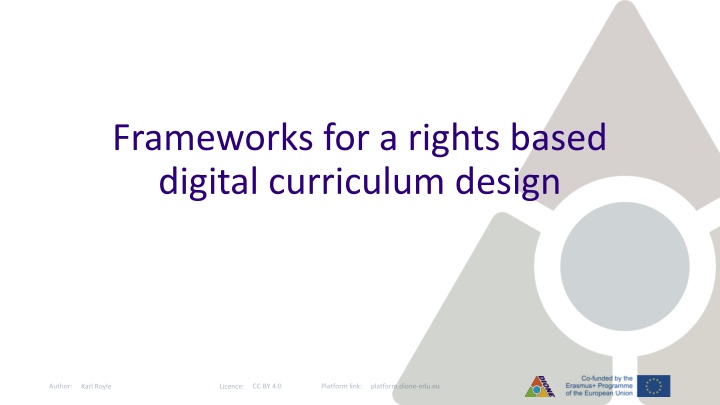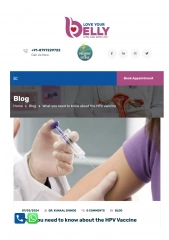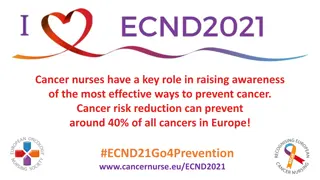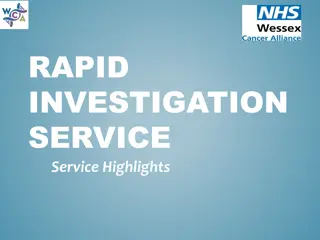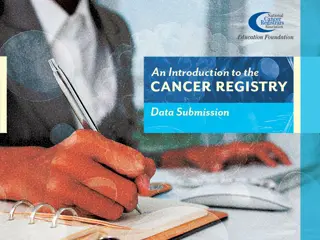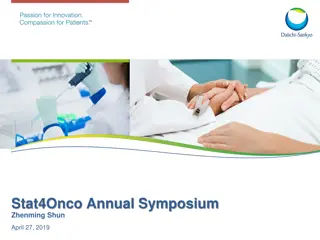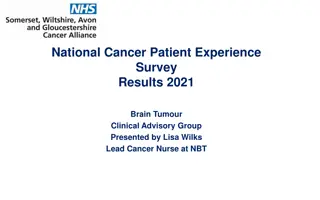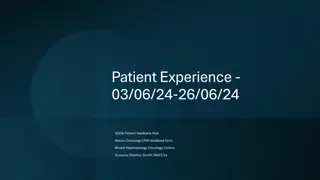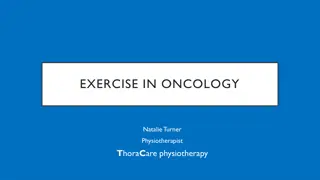Supporting Cancer Patients with Nutrition: A Role in Oncology
Dietitians play a crucial role in supporting cancer patients with nutrition throughout various treatments, combating malnutrition, addressing side effects, and promoting survivorship. They work to ensure proper energy and protein intake, prevent nutritional issues, and provide valuable support alongside medical teams. Referral pathways are outlined for accessing oncology dietitian services.
Download Presentation

Please find below an Image/Link to download the presentation.
The content on the website is provided AS IS for your information and personal use only. It may not be sold, licensed, or shared on other websites without obtaining consent from the author.If you encounter any issues during the download, it is possible that the publisher has removed the file from their server.
You are allowed to download the files provided on this website for personal or commercial use, subject to the condition that they are used lawfully. All files are the property of their respective owners.
The content on the website is provided AS IS for your information and personal use only. It may not be sold, licensed, or shared on other websites without obtaining consent from the author.
E N D
Presentation Transcript
Frameworks for a rights based digital curriculum design Author: Platform link: platform.dione-edu.eu CC BY 4.0 Licence: Karl Royle
Measurement Framework for Equality and Human Rights (2017) Available at: https://www.equalityhumanrights.com/sites/default/files/measurement- framework-word_0.docx Sections: Education Work Living standards Health Justice and personal security Participation in civic life Author: Platform link: platform.dione-edu.eu CC BY 4.0 Licence: Karl Royle
OECD's 11 Areas of Well-Being Author: Platform link: platform.dione-edu.eu CC BY 4.0 Licence: Karl Royle
U.N. Sustainable Development Goals Author: Platform link: platform.dione-edu.eu CC BY 4.0 Licence: Karl Royle
These will be referenced to which framework? DigiCompEdu ? https://joint-research-centre.ec.europa.eu/digcompedu_en Author: Platform link: platform.dione-edu.eu CC BY 4.0 Licence: Karl Royle
DigComp 2.1 The Digital Competence Framework for Citizens? https://joint-research-centre.ec.europa.eu/digcomp_en Author: Platform link: platform.dione-edu.eu CC BY 4.0 Licence: Karl Royle
DQ institute global standards? https://www.dqinstitute.org/global-standards Author: Platform link: platform.dione-edu.eu CC BY 4.0 Licence: Karl Royle
How is the digital/post digital impacting on - Education: Educational attainment of children and young people. Issues -inequality and diversity - digital poverty. Work: To work in just and favourable conditions, to have the value of your work recognised, even if unpaid, to not be prevented from working, and to be free from slavery, forced labour and other forms of exploitation. Issues exploitation, security, value. Author: Platform link: platform.dione-edu.eu CC BY 4.0 Licence: Karl Royle
How is the digital/post digital impacting on - Health: To be healthy, physically and mentally, being free in matters of sexual relationships and reproduction, having autonomy over care and treatment, and being cared for in the final stages of your life. Issues: differences in health outcomes, access to healthcare, mental health, reproductive and sexual health, palliative and end of life care. Justice and personal security: To avoid premature mortality, live in security, and know you will be protected and treated fairly by the law. Issues: conditions of detention, hate crime, homicides, sexual and domestic abuse, criminal and civil justice systems, restorative justice. Author: Platform link: platform.dione-edu.eu CC BY 4.0 Licence: Karl Royle
How is the digital/post digital impacting on - Living standards: To enjoy an adequate standard of living, with independence and security, and to be cared for and supported when necessary. Issues: Poverty, Housing, Social care. Participation: To participate in decision-making and in communities, access services, know your privacy will be respected, and express yourself. Issues: political and civic participation and representation (voting), access to services, privacy and surveillance ( including the collection, use, tracking, retention and disclosure of personal data, is a key human rights concern), social and community cohesion, family life. Author: Platform link: platform.dione-edu.eu CC BY 4.0 Licence: Karl Royle
